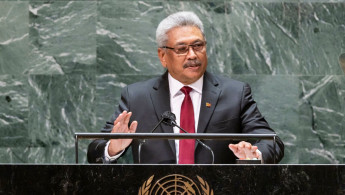Ousted Sri Lanka President Gotabaya Rajapaksa to seek haven in Thailand
Sri Lanka's ousted leader Gotabaya Rajapaksa is seeking a new safe haven in Thailand as his Singapore visa runs out, a source and the Thai foreign ministry said on Wednesday.
Rajapaksa fled to the Maldives on 13 July and then to Singapore, where he announced his resignation after months of protests over the country's economic meltdown.
Tens of thousands of people overran his official residence last month over acute shortages of food, fuel and medicine endured by Sri Lanka's 22 million people since late last year.
"His Singapore visa runs out on Thursday," a close associate of Rajapaksa told AFP in Colombo.
"He had applied for an extension, but it had not come through as of Wednesday morning."
The source said Rajapaksa now planned to go to Thailand for a short stay and return to Singapore.
The Thai foreign ministry confirmed it had received a request from Colombo for the 73-year-old deposed leader to visit Thailand and an assurance that he would not seek political asylum there.
"The Thai side received a request for the former president to enter Thailand from the current government of Sri Lanka," ministry spokesman Tanee Sangrat said in a statement.
"The stay is temporary in nature with the aim of onward travel. No political asylum has been sought."
There was no immediate comment from the Sri Lankan embassy in Singapore, which had supported Rajapaksa's attempt to stay for longer in the city-state.
Sri Lankans arriving in Singapore get a 30-day visa, but Singapore authorities said they had initially given Rajapaksa only two weeks and later extended the visa by another two weeks.
The Rajapaksa confidant told AFP that he was keen to return home as protests against his administration had fizzled out, but his successor Ranil Wickremesinghe had advised him against an early return.





 Follow the Middle East's top stories in English at The New Arab on Google News
Follow the Middle East's top stories in English at The New Arab on Google News


